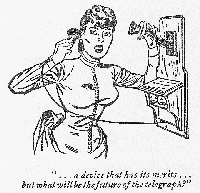|
JULY I, 1882 - Once more I'm away from
home, this time in the frontier town of Sioux City, Iowa, where I've been
temporarily assigned as an operator.
We already have a network of rails
throughout most of this prosperous state, many of which have been laid
only this year.
I arrived here in time for the most
excitement they've had since the people used to get alarmed about possible
Indian raids. The womenfolk in Iowa for some time have been agitating to
have the State constitution amended to ban the sale of liquor. Four days
ago they held the election and it proved an exciting affair.
The women made their men feel quite
foolish, praying in the streets when their husbands went into the voting
booths. It must have done some good, because the women won their point and
carried the election by 30,000 votes.
I understand, though, that the liquor
people intend to appeal the election to the State Supreme Court on some
technical grounds.
NOVEMBER 3, 1882 - I've just returned home
to St. Paul and my family to discover that our Railway now has a girl
switchman! A conductor on The Milwaukee run told me the story only this
morning. It seems that a switch-tender in The Milwaukee yards named
Gsandtner recently was killed at work. His only survivor is a daughter,
Annie, who long has been his helper. Four years ago, when she was only 12,
Annie gained some fame when her father forgot about the switches. She
remembered to open them and saved a train from being wrecked.
Annie has been officially appointed to her
father's position and is doing an exceedingly good job, from all reports.
The conductor told me that between tasks she sits knitting in her little
red switch shanty which already is becoming a mecca for the curious who
have heard the story of her position.
DECEMBER 14, 1883 - Events on the Railway
have moved so fast this year that now is an opportune time for a summing
up: President Mitchell recently pointed out that "the rapidity of the
settlement of Dakota is a marvel of the times." During the past year more
than twelve million acres of land have been taken up for cultivation by
settlers. Our lines in Dakota, built mostly in advance of settlements,
will at an early day be supplied with an abundance of traffic, from all
indications. In fact, our Railway has been expanding in all directions
with little or no aid in the form of Government land grants.
Rails have been pushed on the Chippewa
Valley & Superior Division from Eau Claire, Wis. to Chippewa Falls, Wis.;
from Cedar Rapids, Ia. to Ottumwa, Ia.; and in Dakota they have been
extended 81 miles to make a continuous line in the James River Valley from
Yankton, northward by way of Mitchell, through Aberdeen to Ellendale, a
distance of 250 miles.
JANUARY 3, 1884 - My wife and I have
decided to take advantage of one of the newest conveniences, the
telephone, of which there already are more than 100 in the city. Although
this device undoubtedly has its merits, I am inclined to be somewhat
skeptical from a purely personal standpoint. Should these instruments be
placed in use generally throughout the country, what will be the future of
the telegraph? Nevertheless, we have made application to have one
installed. which there already are more than 100 in the city. Although
this device undoubtedly has its merits, I am inclined to be somewhat
skeptical from a purely personal standpoint. Should these instruments be
placed in use generally throughout the country, what will be the future of
the telegraph? Nevertheless, we have made application to have one
installed.
MARCH 19, 1884 - The Chicago, Milwaukee &
St. Paul Railway has scored another first! Just yesterday we inaugurated a
new fast mail train between Minneapolis - St. Paul and Chicago.
No less a personage than the Postmaster
General proposed that we operate a fast mail train. Our officials acted
with such dispatch that at 10:05 the next night the train began its first
run from Chicago. Carrying no passengers and consisting of four coaches -
three mail and one storage car - it arrived here promptly at 7:00 A.M. |
















